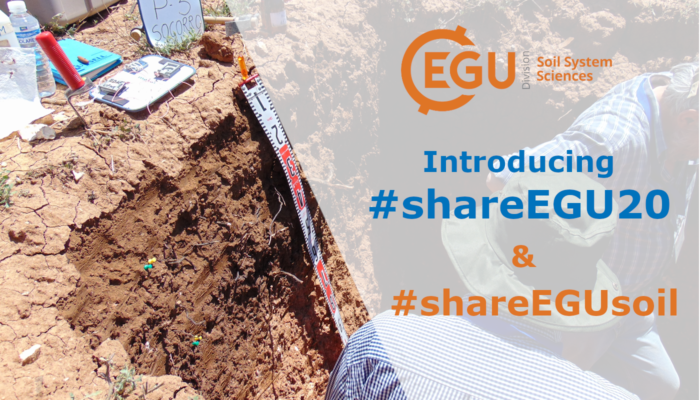
Firstly, we hope that all of you, as well as your relatives, are staying healthy and safe at home. COVID-19 has spread around the planet, sending billions of people into lockdown. We are sure that we can overcome this crisis by supporting each other and making our best with our individual actions.
As you have probably noticed, the physical EGU General Assembly 2020 has been officially cancelled. During the last month, many questions about the EGU’s perspective and actions have been raised, and all teams have been working tirelessly to address them. On the bright side of life, the recent developments have opened a unique opportunity to reconsider the way we as scientists work, teach and interact with each other and the non-academic world.
Science must go on! For that purpose, EGU has recently launched EGU2020: Sharing Geoscience Online (#shareEGU20) that still allows us to share our work this year. This brings some advantages. Firstly, #shareEGU20 is not limited to the EGU week since authors could already start sharing their presentations from 1 April and their public discussion will continue until 31 May. This interaction will then culminate in the form of live chats organized during EGU week (3-8 May) in time slots assigned to each session. As another advantage, viewing presentations, their public discussion and live chats will be open to anyone.
Also, our EGU colleagues are constantly working and addressing potential hick-ups associated with the challenging circumstances in which #shareEGU20 has come to life. We ask for your understanding and you can always refer to the official website for further inquiries. We will also update this blog post if needed – feel free to leave questions for us in the comments under this blog post!
Who can participate in #shareEGU20
#shareEGU20 is open to anyone and free of charge. Anyone who submitted an abstract can present their work on-line and anyone can view and interact with this material, independently of whether they were registered for the physical meeting or not. If you’ve already paid a registration fee for EGU20, you will be reimbursed1 automatically during the following weeks, independently of whether you take part in #shareEGU20 or not.
How to attend #shareEGU20 as an author
Between 1st April and 31st May, you can upload your presentation material to your so-called “display”. This should be a single file with a text, poster, powerpoint presentation, or a video in one of the following formats: *.pdf, *.ppt/pptx, *.pps/ppsx, *.png, or *.mp4 file with size of up to 50 MB (to allow fast download and viewing). Authors can choose whether they allow comments and feedback on their presentation materials (from anybody logged in with a Copernicus ID). Author comments are identified as AC, while community comments are marked as CC and none of them can be deleted by their authors once posted.
We would prefer that the presentation material are distributed under the Creative Commons Attribution 4.0 License allowing anyone to share them as long as the authors are cited, but if necessary authors can upload under a rights reserved licence if they would feel more comfortable with that. Your abstract has already been uploaded under the Creative Commons licence, and has received a DOI and will remain on www.egu2020.eu as accepted contribution
The system allows you to upload as many versions of your presentation material as you need. If you upload a new version within 15 minutes of the last upload and the former version did not receive any comments, the new version will replace the former one, resulting in only one version of display. This is what you will see if your display then receives a comment:
Then if you update your display and your former version has already received comments or more than 15 minutes have passed since your last upload, your updated version will be displayed alongside the former version resulting in two publicly visible versions of display:
Bear in mind that this year no distinction will be made between oral, poster, or PICO presentation types and consequently, the OSPP contest will be paused this year.
How to attend #shareEGU20 as a guest
Anyone can access the on-line presentation materials via the meeting programme once they’re uploaded. For this you don’t need a Copernicus ID. If you wish to interact with the author by providing comments, you need to log in with a Copernicus ID and disclose your name. #shareEGU20 will be open for comments between 1 April and 31 May, on top of which a live chat will be open for each session during the EGU week (3 – 8 May). You can attend live chats even if you haven’t been registered for this year’s GA and you don’t need a Copernicus ID for this. However, with a Copernicus ID, you can design your own schedule in the meeting programme as usual.
When commenting, consider that once posted, you cannot delete your comments. Also please note that the presentation materials are under the Creative Commons Attribution 4.0 License which means that you can share them as long as the authors are cited.
How to attend #shareEGU20 as a convener
If you’re a convener, you should have already received an email with the rescheduling of your session for the new format.
This time, all presentations, so-called displays, will have the same format, without poster, oral nor PICO distinction. Session dynamics will be the same as followed during conventional GA: conveners and/or chairpersons will moderate the chats, introduce the session while ensuring that all displays receive some notice. For that purpose, we encourage you to invite authors to upload displays connected with their abstracts and to opt in to allow comments by the community.
No worries, during the whole GA you’ll be able to discuss and exchange ideas between authors and colleagues. As with the physical General Assembly in Vienna, we encourage conveners to play an active role in the session and keep in touch with their authors, using a text-based chatroom. Be aware that chats will not be recorded to promote an open discussion between authors and other participants.
The chat room of your session will open 15 minutes prior to the scheduled session start, will be linked from your session in the online programme, and will be available until 30 minutes after the scheduled end of the session. You and your chairpersons are kindly asked to moderate the chat: you can introduce the session, ensure that all displays get some attention, and ask questions to stimulate the discussion.
Now repeat how to navigate to #shareEGU20 and get ten points for Gryffindor!
We are aware that all these new modifications can result in a headache. That’s why EGU organized a webinar last Monday featuring Chloe Hill (EGU Policy Officer), Alberto Montanari (EGU President) and Susanne Buiter (PG Chair), to help you understanding how to get involved in #shareEGU20. If you missed it, no worries! Not it is available online in EGU’s YouTube channel at https://egu.eu/77TU0C. Moreover, you can find lots of insights and an intense Q&A towards the end!
In the following weeks and during EGU week of Monday 3 – Friday 8 May 9.00-18.00 CET, we encourage you to follow our social media accounts (Tw: @EuroGeosciences, @EGU_SSS) and our official hashtags #EGU20 and #shareEGU20 and #shareEGUsoil which will help you to navigate #shareEGU20.
#StayAtHome
To put it in a nutshell: we’re looking forward to seeing you at #shareEGU20! Take care, maintain solidarity and #StayAtHome.
Final remarks
1No further actions are needed! You will receive the reimbursement along with a PDF file. Reimbursement does not involve (1) extra fees that could have been charged by your bank or credit-card company, (2) the EGU membership fee, which will stay valid for one year and gives you benefits such as membership rates for events held by EGU’s sister organizations AGU, AOGS, and JpGU, as well as the ability to apply for EGU funding and prizes and to stand for Council or Early Career Scientist positions, and the (3) abstract processing charge, since your abstract will receive a DOI and remain publicly available online. EGU also cannot reimburse your travel and accommodation expenses, but it provides a formal letter of cancellation for potential refunds here. In any case, if you notice some missing links or any mistake regarding your communication and schedule, as well as if you’d like to withdraw your abstract, we suggest you to contact egu2020@copernicus.org and ask for help.
Acknowledgments
Authors thank Steffen Schweizer for providing comments on this blog post.
Written by:
Layla is a PhD student at the Institute for Natural Resources and Agrobiology of Seville, Spain (Spanish National Research Council; IRNAS-CSIC). Her research focuses on soil organic matter carbon turnover rates in representative Mediterranean soils from southern Spain. She is currently one of the blog editors of the EGU Soil Science System Division Blog and also collaborates actively with social media outreach.
Olga is a postdoctoral researcher at the University of Antwerp. Her research interests lie primarily in the areas of soil biogeochemistry, soil formation and restoration ecology. Under EGU Soil System Science Division, Olga is the Secretary for News and Outreach, webmaster and one of the blog editors.




